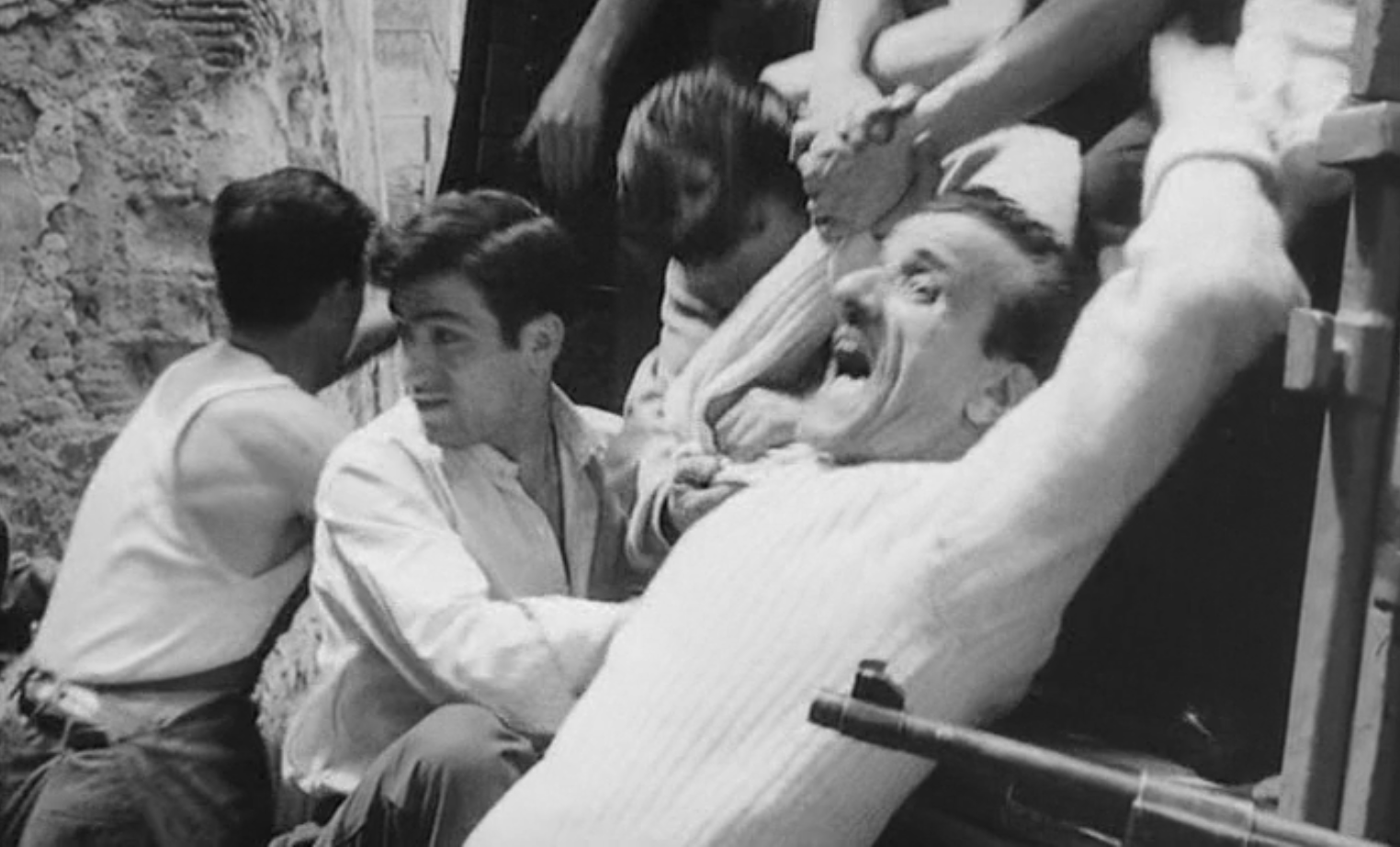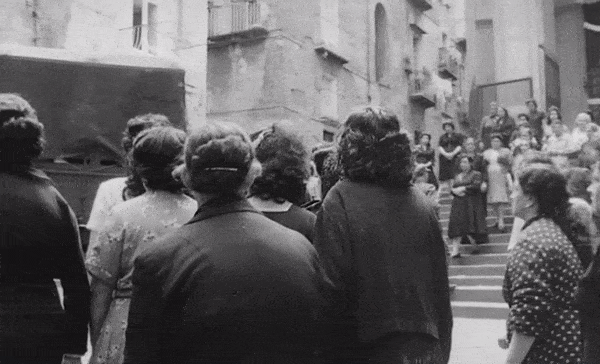Regia / Director: Nanni Loy, 1962
I veicoli militari rombano per le strade e i vicoli, ne escono i soldati tedeschi, che corrono con i fucili in mano.
The military vehicles roar through the streets and alleyways, out pour the German soldiers, running with rifles in their hands.
Irrompono negli edifici e radunano gli uomini. Mentre afferrano un vecchio in pigiama e lo spingono fuori dalla porta, lui protesta: "Lasciatemi! Ma cosa abbiamo fatto?"
They burst into buildings, rounding up the men. As they grab an old man in pajamas and push him out the door, he protests, “Let me go! What have we done?”
Catturano altri due uomini: "Ma chi cercate? Non siamo noi!"
They seize two other men: “Who are you looking for? Not us!”
Vedendo ciò che sta accadendo, Immacolata corre a casa.
Seeing what’s happening, Immacolata runs home.
Giovanni sta finalmente dormendo, ma irrompono due soldati. Lo afferrano e lo tirano su, mentre il bambino li guarda.
Giovanni is finally sleeping, but two soldiers burst in. They grab him and pull him up, as the baby looks on.
Giovanni non capisce questo trattamento da parte dei tedeschi: non sono loro i suoi alleati? "Dove mi portate? Sono un reduce! Ho fatto la guerra!"
Giovanni doesn’t understand this treatment from the Germans: aren’t they his allies? “Where are you taking me? I’m a veteran! I was in the war!”
Mentre esce si prende i pantaloni. Il bambino rimane solo, piangendo.
He grabs his pants on the way out. The baby is left alone, wailing.
In strada è un pandemonio: squadre di soldati costringono gli uomini a uscire dalle case e respingono le donne.
In the street, it is pandemonium: teams of soldiers force the men out of their houses, and push back the women.
Mani dietro la testa, gli uomini vengono caricati sui camion.
Hands on the back of their heads, the men are loaded into trucks.
A soldier bangs on a door with the butt of his rifle. Wearing a black shirt, a man comes out with a proud Fascist salute. “Heil Hitler! Heil Mussolini! I’ve always been a Fascist!”
Nevertheless, the soldiers drag him away.
Un soldato batte su una porta con il calcio del fucile. Con indosso una camicia nera, un uomo (Enzo Turco) esce con un orgoglioso saluto fascista. "Heil Hitler! Heil Mussolini! Sono sempre stato fascista!"
Tuttavia, i soldati lo trascinano via.
Appare la moglie (Vera Nandi): "Arnaldo! Voglio venire con te! Ma dove lo portate?!"
His wife appears: “Arnaldo! I want to go with you! Where are you taking him?!”
Dal balcone, chiama rivolta verso il basso: "Arnaldo!"
Attraverso le sbarre, vediamo degli uomini in piedi sul retro del camion. Arnaldo sta ancora lottando per far valere le sue ragioni: "Come diavolo si dice 'fascista' in tedesco?"
From the balcony, she calls down, “Arnaldo!”
Through the bars, we see men standing in the back of the truck. Arnaldo is still struggling to make his case: “How the hell do you say ‘Fascist’ in German?”
In un vicolo tranquillo, Concetta siede con Gennarino sui gradini di una chiesa. "Assuntina che fa?"
"Sta bene. Ma non farti vedere, sennò lei si mette a piangere".
Gli accarezza la mano, la guancia. "Hai ragione. Sei diventato giudizioso. La guerra fa crescere, vero?"
In a quiet alley, Concetta sits with Gennarino at the steps of a church. “How is Assuntina doing?”
“She’s fine. But don’t let her see you or she’ll start crying.”
She strokes his hand, his cheek. “You’re right. You’ve gotten wise. War makes one grow up, doesn't it?”
Lei tira fuori dal cestino una patata bollita. "Mangiatela qua. Sennò, se la vedono te la portano via".
She pulls a boiled potato out of her basket. “Eat it here. Otherwise, if they see it, they’ll take it away from you.”
Lui addenta la patata e la divora come se non ci fosse un domani.
He bites into the potato and gobbles it down like there’s no tomorrow.
La madre lo guarda con dolore, poi distoglie lo sguardo.
His mother gazes at him sorrowfully, then looks away.
"Ma tu non ne vuoi?" chiede lui. Lei scuote la testa. Lui dà un altro morso.
“But don’t you want some?” he asks. She shakes her head. He takes another bite.
"Assaggiane un po'", la esorta lui.
Lei sorride. "Solo per sentire se è buona. Se sapessi dove l’ho trovata!"
“Taste a little,” he urges.
She smiles. “Only to see if it’s good. If you knew where I found it!”
Dà un piccolo morso, poi restituisce la patata al figlio. "Ora è meglio che me ne vada".
She takes a tiny bite, then gives the potato back to her son. “Now I’d better get going.”
"Mamma, quando torniamo a stare tutti insieme?"
Senza rispondere, lei gli dà una mela per Assuntina. "Non la mangiare tu, mi raccomando!"
“Mama, when will we be all together again?”
Without answering, she gives him an apple for Assuntina. “Don’t eat it yourself, mind you!”
I camion arrivano allo stadio, con le donne ancora all'inseguimento.
The trucks arrive at the stadium, with women still in pursuit.
Guardando dal camion, un uomo chiede: "Dove ci portano?"
"A giocare a calcio", risponde un altro.
Looking out from the truck, a man asks, “Where are they taking us?”
“To play soccer,” another answers.
Le donne si avvicinano di corsa. Una chiama, in italiano: "Avete visto mio figlio? Si chiama Mario. Ha i capelli rossi. È alto e magro". I soldati bloccano loro la strada.
The women come running up. One calls out, in Italian, “Have you seen my son? His name is Mario. He’s got red hair. He’s tall and skinny.” The soldiers block their way.
Mentre gli uomini vengono scaricati dai camion allo stadio, il vecchio in pigiama chiama le donne: "Avvertite che siamo ancora vivi!"
As the men are unloaded from the trucks at the stadium, the old man in pajamas calls over to the women, “Let everyone know that we’re still alive!”
Le donne lottano contro i soldati. "Dove vi portano? In Germania?"
"Avvisate mia madre! Colletta Teresa!"* L'angoscia dell'uomo è evidente nella sua faccia, nelle sue mani imploranti.
*L'uso del cognome e poi del nome di battesimo è diffuso in tutta Italia per le situazioni formali, e nel Sud Italia anche in contesti informali.
The women struggle against the soldiers. “Where are they taking you? To Germany?”
“Tell my mother. Colletta Teresa!” The man’s anguish is evident in his face, in his pleading hands.
*The usage of last name, then first name is found throughout Italy for formal situations, and in the South of Italy even in informal contexts.
Torniamo al quartiere, altri napoletani vengono radunati. Mentre viene caricato su un camion, uno urla: "Carmen!" I soldati tengono a bada le donne con i loro fucili. "Teresa!"
Back in the neighborhood, more Napolitan men are rounded up. As he’s lifted into a truck, one calls out, “Carmen!” The soldiers hold the women at bay with their rifles. “Teresa!”
Con un'espressione determinata, le donne avanzano e i soldati indietreggiano, continuando a imbracciare i fucili per sbarrare la strada.
With determined expressions, the women move forward, and the soldiers step back, still holding their rifles to bar the way.
Le donne continuano ad avanzare. Vediamo i loro volti in primo piano: sono determinate a liberare i loro uomini.
The women keep advancing. We see their faces in close-up: they are determined to free their men.
Una grida: "Dateci i nostri uomini!" e tutte le altre ripetono il richiamo. Raggiungono un camion e ne scardinano il portello posteriore. Gli uomini saltano fuori mentre il camion si allontana.
One yells, “Give us our men!” and all the others repeat the call. Reaching a truck, they unbolt the back gate. Men jump out as it rolls away.
Le coppie si abbracciano brevemente e poi scappano. La folla si disperde.
Ma dove possono nascondersi dagli invasori? Dall'alto li guardiamo sparpagliarsi. Sembrano così piccoli e il futuro è così incerto.
Couples embrace briefly and then run off. The crowd scatters.
But where can they hide from the invaders? From above, we watch them disperse. They seem so small, and the future is so uncertain.
FINE PARTE 7
Here is Parte 8 of this cineracconto. Subscribe to receive a weekly email newsletter with links to all our new posts.















































































